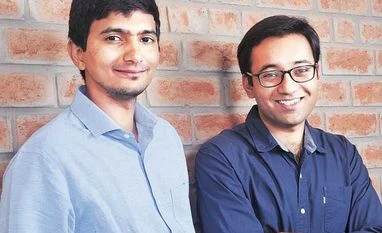It took them just around 15 days to close their first round of funding back in 2014, and the investors who participated in the round included two of the most successful stories in the Indian internet space -– Sachin Bansal and Binny Bansal. Since then, there’s no looking back for both Tarun Mehta and Swapnil Jain, the two young entrepreneurs who have been working hard to build the ‘Tesla of India’ through their venture Ather Energy, step by step.
After years of endurance and unflinching dedication, they are all set to hand over the keys of their dream products -– all-electric smart scooters -– to the first set of customers sometime in September. While Ather’s e-scooters may be no match for Elon Musk’s Tesla cars in terms of value and innovation, they certainly contribute to energy-starved India’s mobility issues.
In 2013, when both Mehta and Jain quit their jobs at Ashok Leyland and General Motors, respectively, all that the two IIT-Madras graduates had was a raw idea meant to solve a global energy crisis. And they turned to their alma mater for help. The duo was given a small space at IIT-Madras’ Research Park, and were backed strongly by R Krishna Kumar, a professor in the Department of Engineering Design, who put in the initial seed capital of Rs 500,000, apart from providing moral support.
It was at the Research Park that Mehta and Jain met Vivek Durai, an alumnus of National Law School who was incubating TermSheet, a deal-making platform for startups. Backed by a few years of experience from top legal firms, Durai was building a platform to standardise fund raising for startups. Ather was the first company that used the platform and successfully closed $1 million in the initial round from Bansals as well as Raju Venkatraman, a serial entrepreneur and CEO of Medall Healthcare. This proximity with Sachin Bansal early in the journey actually opened up the door to Tiger Global and Lee Fixel, its high profile partner who is looking after the PE major’s India portfolio and is said to be the brain behind Flipkart's success.
“Just before Tiger’s investment came, Tarun flew to New York to meet Lee Fixel on Sachin’s recommendation. There was no powerpoint, no pitch take. They had a long conversation. That says a lot about Fixel and also about Tarun,” said a person close to Mehta and Jain.
In May 2015, Ather closed $12 million (around Rs 753 million) in funding from Tiger Global, followed by another round of $30.5 million (Rs 2.05 billion) by Hero MotoCorp, a year later. The company has raised around $43 million till date and has filed 43 patent applications and 122 design registrations in India and abroad.
“Both of them (Ather Energy founders) have certain qualities that make them different from others. Tarun is very matured in his approach. They are very clear that the product comes first. They tell investors that this is what we are building, and if you want to invest, come and invest,” said Durai, who is now running a business intelligence platform, Paper.vc.
Ather may have made significant strides during the past five years, but for Mehta and Jain, it was not an easy drive. From putting together a critical mass of 250 engineers to finding deep-pocketed investors to even shifting the deadline for product launch a few times, the two entrepreneurs have seen it all. One of the first few mistakes they made was underestimating the timing required to build such a complex, capital intensive product.
Mehta, however, points out that change in the perception towards electric vehicles (EVs) is the biggest variable he has seen in the last five years. "With a number of launches globally during the past five years, EVs have now taken the mantle of next generation vehicles. So, when you launch vehicles at this time, people come out to see them," Mehta said. The battery technology driving the whole EV ecosystem has also drastically changed with the price of lithium-run battery down by almost half the past six years.
Taking advantage of these factors, Ather has launched two variants of its electric scooter in June this year, which will be commercially rolled out starting September. While Ather 340 is priced at Rs 109,750, Ather 450 comes at a price tag of Rs 124,750.
For this premium price, Ather is offering features that have never been seen in India’s scooter segment before. These scooters come with fully-coloured dashboard with in-built navigation, while the on-board SIM card allows the company to roll out over-the-air (OTA) updates for the software and firmware, similar to what Tesla Motors does for its $100,000 cars.
As Ather Energy chugs ahead with its disruptive technological intervention, it also plans to be a mass market player going ahead with reduction in its scooter prices. "Ather is for the country and we will build products that every customer can buy. We don't want to be limited to a specific segment," Mehta adds.
Unlock 30+ premium stories daily hand-picked by our editors, across devices on browser and app.
Pick your 5 favourite companies, get a daily email with all news updates on them.
Full access to our intuitive epaper - clip, save, share articles from any device; newspaper archives from 2006.
Preferential invites to Business Standard events.
Curated newsletters on markets, personal finance, policy & politics, start-ups, technology, and more.
)